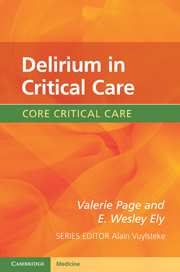Book contents
- Frontmatter
- Contents
- Foreword
- Delirium, a patient testimony
- 1 What is delirium in critical care?
- 2 How common is delirium in critical care?
- 3 What does delirium look like in critical care?
- 4 Delirium in critical care: how does it happen?
- 5 Delirium: what causes it? Risk factors
- 6 Delirium in critical care: why is it important?
- 7 Delirium in critical care: how do we diagnose it?
- 8 How to prevent delirium?
- 9 Treatment of delirium in critical care
- 10 Mental capacity and restraints
- 11 End-of-life care
- 12 What is the future?
- Selected references
- Index
- References
11 - End-of-life care
Published online by Cambridge University Press: 05 December 2011
- Frontmatter
- Contents
- Foreword
- Delirium, a patient testimony
- 1 What is delirium in critical care?
- 2 How common is delirium in critical care?
- 3 What does delirium look like in critical care?
- 4 Delirium in critical care: how does it happen?
- 5 Delirium: what causes it? Risk factors
- 6 Delirium in critical care: why is it important?
- 7 Delirium in critical care: how do we diagnose it?
- 8 How to prevent delirium?
- 9 Treatment of delirium in critical care
- 10 Mental capacity and restraints
- 11 End-of-life care
- 12 What is the future?
- Selected references
- Index
- References
Summary
Introduction
In palliative care, delirium may be referred to as cognitive failure, terminal restlessness or terminal agitation. At least, the terminology is inconsistent in both palliative and critical care! It is sad that these names imply that delirium is an inevitable part of the dying process. Delirium episodes in palliative care are potentially reversible in up to 50% of cases.
It is estimated that one in five Americans die in US intensive care units. Patients are admitted to ICU suffering from acute episodes of chronic illnesses, and patients with advanced incurable diseases are brought in to manage consequences of treatment or progression of disease. The terminal stage of illness is sometimes only recognized after admission. Previously fit patients can succumb to the complications of acute illness, developing irreversible multiple organ failure.
Delirium is distressing for patients and caregivers, even more when it happens at the end of a life. The attention deficits impede communication with families and hinder participation in treatment decisions, counselling and symptom assessment.
Clarity of cognitive function before dying is a precious gift to patients, caregivers and relatives. In end-of-life care, clinicians have to balance aggressive detection and management of delirium with addressing other treatment needs such as pain relief and sedation.
- Type
- Chapter
- Information
- Delirium in Critical Care , pp. 191 - 201Publisher: Cambridge University PressPrint publication year: 2011

